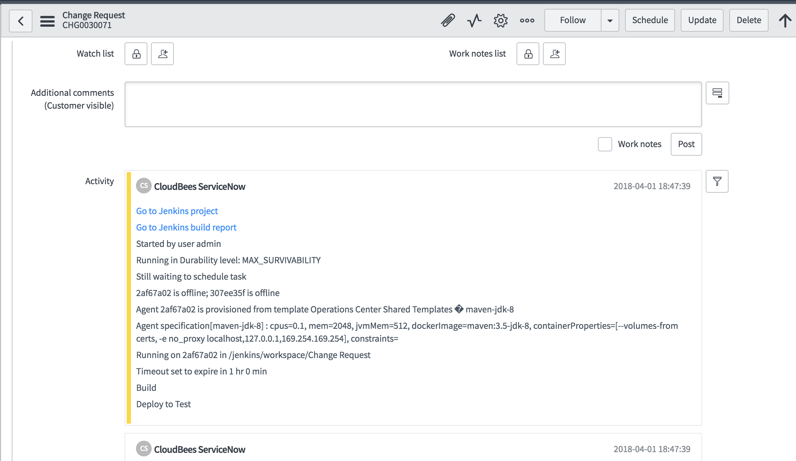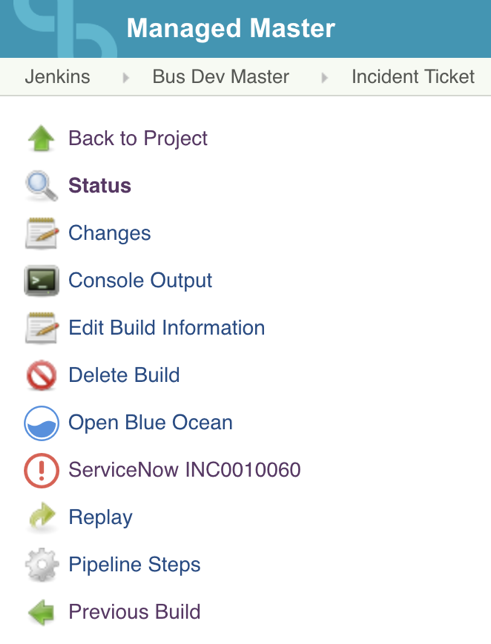Give your IT department a break. Don’t deliver software in the dark.
Your software organization has adopted continuous integration and continuous delivery, and you are pushing software deliveries faster than ever before. But now you are losing visibility into the volume of software changes that are being pushed to your environments. Latest code changes are being pushed to numerous test, staging and production environments rapidly. Multiple projects and teams are pushing software on shared systems. How do you track these changes with your IT service management (ITSM) system? If you discover an issue in an environment, how can you or your IT team quickly look in one place to understand what changes have occurred there? Better yet, how can you automatically discover an issue and immediately create an incident ticket associated with the software change?
CloudBees now provides the only certified solution that enables ServiceNow Change Management and Incident Management for your Jenkins projects. Your Jenkins pipelines can now automatically track software changes and create incident tickets in ServiceNow.
ServiceNow’s Change Management is a powerful tool that allows you to manage and track your IT systems that are in constant change. Know what systems are impacted and what was done. Know every bit of detail from hardware, software, patches, licenses, and more. For a large enterprise organization change management is a necessity.
ServiceNow’s Incident Management allows you to quickly initiate incident resolution workflows and immediately notify the proper teams. It can automatically gather data from other systems and provide those teams with the information they need to accomplish their tasks. It can even help your teams prioritize those tasks. But more importantly, it eliminates inefficiencies and enables your teams resolve issues fast.
By integrating your Jenkins pipelines with ServiceNow’s change and incident management, you can take advantage of the following benefits:
Change Management
- Automatically create change requests reflecting software updates to your various IT systems and environments.
- Centrally manage large volumes of software changes using ServiceNow.
- Root cause IT system issues due to software change activity. Automatically include relevant change data and logging.
- Take advantage of ServiceNow change management automation for CI/CD processes.
Incident Management
- Automatically create and assign incident tickets from failures in your Jenkins pipeline.
- Post incident notifications, assign incident tickets and include log data automatically.
- Take advantage of ServiceNow incident workflow management and automation for failures.
How Does It Work?
This solution includes a ServiceNow App and Jenkins plugin. The Jenkins plugin provides the new functions to create change requests and incident tickets in your pipeline. The ServiceNow App installs in your ServiceNow instance and provides the interfaces to accept change requests and incident tickets. Both are required.
Change Management
Within your Jenkins pipeline simply add the following script code:
.
.
.
stage('Deploy to Production') {
steps {
echo 'Deploy to Production'
script {
def request = ChangeRequest shortDescription:'Deploy
to Test',type:'Standard',category:'Other',impact:'3
- Low',risk:'Moderate',priority:'4 - Low',ci:'AS400'
createChangeRequest changeRequest: request
}
}
}
.
.
.
You can include many more change request fields.
When your pipeline executes, it automatically creates the change request in ServiceNow and it looks like this.

Your build log is included in the change request as well as links back to your Jenkins project and build.
On the Jenkins server side, you also have quick links to any ServiceNow change requests.

Incident Management
If your pipeline has a failure, you can automatically create an incident ticket with the following. It is a best practice to do this in your post section.
.
.
.
post {
failure {
script {
def ticket = IncidentTicket shortDescription:'Build
failed!',callerId:'Beth Anglin',impact:'3 -
Low',urgency:'3 - Low'
createIncidentTicket incidentTicket: ticket
}
}
}
Like change requests, your build log and link backs are included in the incident ticket.

And you have an incident ticket link from your Jenkins build.

With just a few lines in your pipeline script, you have enabled centrally managed software change tracking and automatic incident management for your organization. You are no longer delivering software in the dark!
To learn more about the CloudBees ServiceNow Integration, read the solution brief or watch the demo . Or if you’re at Knowledge18, stop by booth #2516 to learn more.